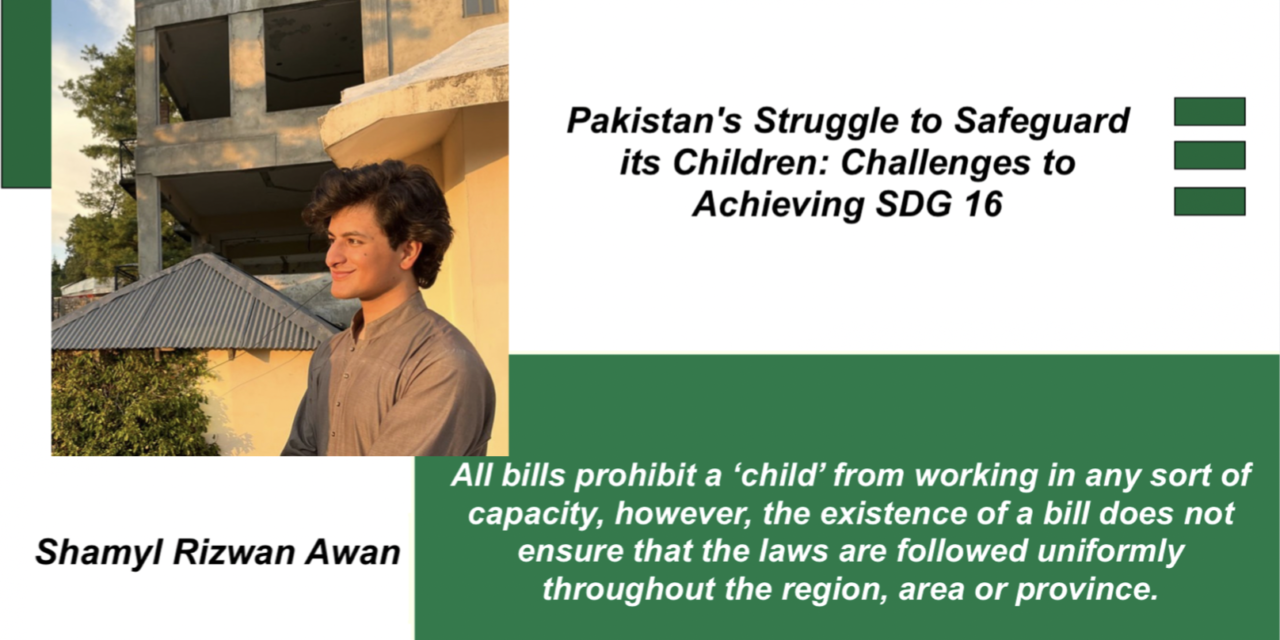Sustainable Development Goal 16 (SDG 16) is titled “Peace, Justice and Strong Institutions.” This goal is pertinent to achieving Agenda 2030 laid down by the United Nations for Sustainable Development. This goal aims at strengthening human rights and reducing exploitation against all genders, children, minorities, and vulnerable communities by promoting non-discriminatory laws alongside effective governance. Under the ambit of strengthening the rule of law by making inclusive and strong institutions free of corruption, target 16.2 of this goal explores Pakistan’s National Initiative for Sustainable Development Goals, titled: “Protect Children from Abuse, Exploitation, Trafficking and Violence.” Its objective is to end all sorts of abuse, torture and violence perpetuated against children ranging from slavery, child labour and assault including sexual violence.
Pakistan at the federal and provincial levels has acts of parliament alongside the penal code that covers some form of protection of children from labour and assault, something that even the Constitution enshrines; where under Article 11(1), it bans slavery and under 11(2), it bans forced labour and trafficking. However, interestingly though, 11(3), states that a child under 14 years of age cannot be under employment at a factory, a mine, or any hazardous engagement. Here, a fundamental issue lies with the age of 14 being the minimum requirement for these possibly hazardous activities, the constitution sets the bar too low which allows for loopholes and misuse via duress.
Furthermore, the constitution at this point is silent on domestic labour, which might not be hazardous and may employ a lot of minor children, even those under the age of 14 are not only stripped of their childhood but undergo abuse on a regular basis.
The Employment of Children Act of 1991 and similar bills passed in provinces such as Punjab, KPK and Sindh describe a child as someone who is younger than 14 years of age (15 in the case of Punjab), whereas the individual placed between the age of 14 (15 for Punjab) and the age of 18 is described as an adolescent.
All bills prohibit a ‘child’ from working in any sort of capacity, however, the existence of a bill does not ensure that the laws are followed uniformly throughout the region, area or province. Even after this, we see a lack of implementation leading to children being employed in the most terrible of conditions in factories, mines and even brick kilns.
Furthermore, this is often done within the informal economy, meaning there is no set standard for a minimum salary amount. In many areas, especially those plagued with feudalism and corruption, children as young as five are coerced to work to pay off family debts. This often leads the children to be victims of modern slavery.
A paradox, a violation of fundamental human rights and the constitution yet an undeniable occurrence.
These practices are prevalent throughout the country. Children and their families stand powerless, unable to take legal action due to duress, illiteracy, and the absence of effective implementation of the rule of law. The late Iqbal Masih, a child activist murdered at the age of 12 who dared to stand up against child slavery and bondage, suffered from similar conditions to pay off the ever-increasing debt his father once took. He escaped at age 10 (after being sold at the age of 4) after he learnt that bonded labour was declared illegal by the Supreme Court. He used to be chained to a loom and forced to work 14 hours a day while being paid only 1 rupee a day. He was inspirational and helped over 3,000 bonded children escape before being murdered in 1995.
Unfortunately, this is a continuous struggle for children in Pakistan. In May 2020, Zohra, an 8-year-old child domestic worker was brutally assaulted for mistakenly releasing two parrots from a cage in Rawalpindi; she died the very next day. Illegal under the constitution and inhumane by morality, yet only a handful of cases make it to mainstream media. An 11-year-old boy was assaulted for eating from his employer’s fridge, 16-year-old Uzma was tortured and murdered for eating a piece of meat without permission in 2023 and 14-year-old Rizwana was tortured nearly to death in Islamabad. In the Federal Capital, Islamabad, which bans domestic child workers (DCW), no one under 18 is allowed to work. Similar is the horrifying case of Fatima a 10-year-old raped and murdered. The safeguarding of our nation’s children is necessary at all levels.
On 29th August 2023, the United Nations resident coordinator in Pakistan, Julien Harneis, stated that he believes Pakistan will not be able to achieve the SDGs by 2030. Unless Pakistan strengthens and redefines its laws and works toward the effective implementation of a strong rule of law, there will be no eradication of abuse, torture, and violence against children. Alongside this, the promotion of Articles 37 and 38 to promote the well-being of individuals is necessary for ensuring the nation’s socio-economic development and increased quality of life. Once we bridge the gap between the privileged and underprivileged in our society, we become one step closer to ensuring fewer miscarriages of justice and achieving an equal society.
The writer is a law graduate from Islamabad


